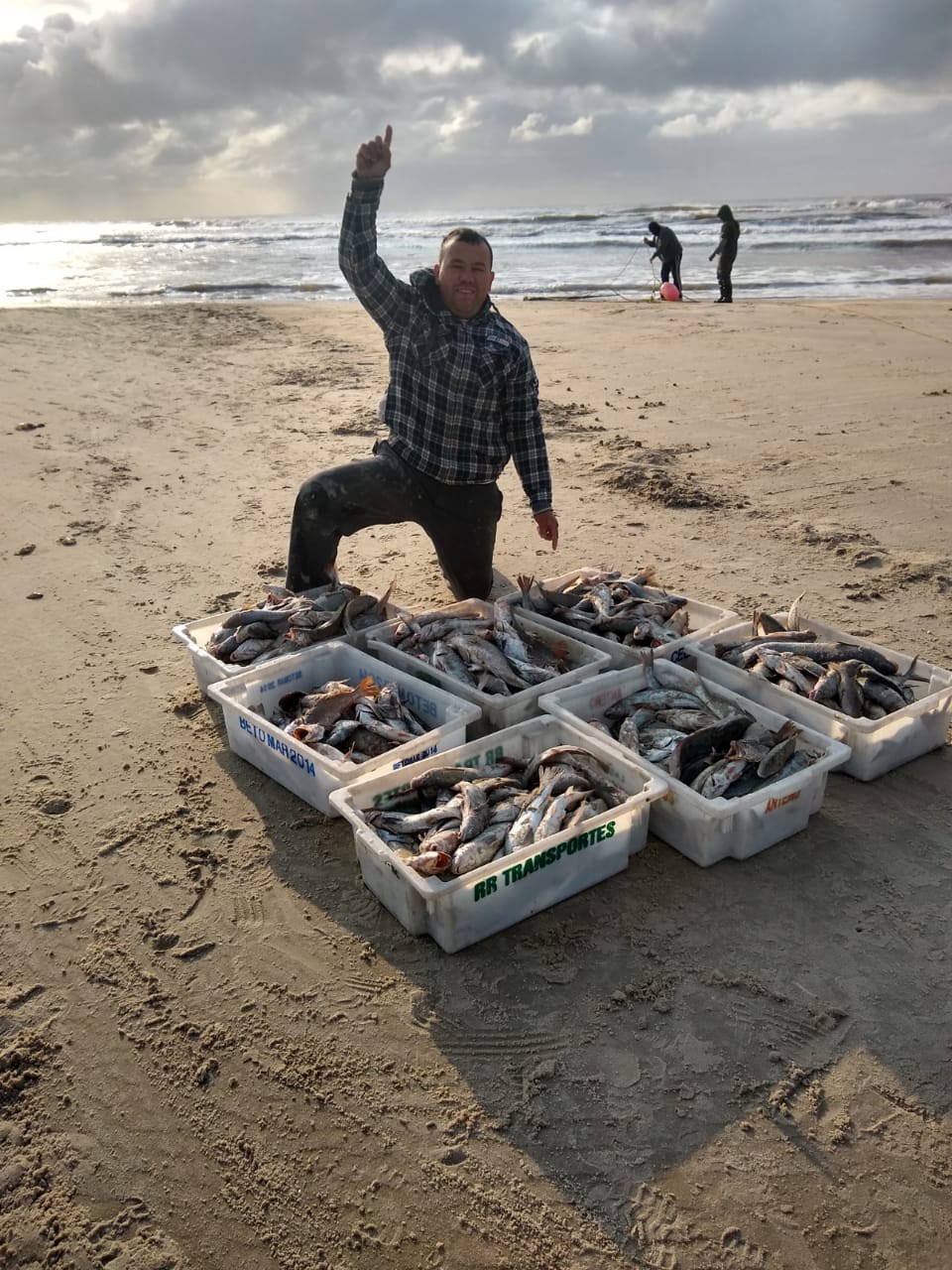November 19, 2020
‘Shrimp are coming back’ in Southern Brazil following Oceana-backed bottom trawling ban, local fishers report
BY: Emily Nuñez
Daniel Guglieri, sporting a full beard and a beanie to shield him from harsh winds at sea, is pictured flashing a smile and a thumbs up. The reason for his good mood lies behind him on the beach: two tidy rows of crates, all brimming with tasty crustaceans.
Guglieri is an artisanal fisher in Rio Grande do Sul – Brazil’s southernmost state – and he knows all too well that abundant shrimp means abundant business. This bounty is not something that fishers take for granted because they’ve seen what happens when their local waters are depleted by bottom trawls. For years, industrial fishers from the neighboring state of Santa Catarina sailed south to Rio Grande do Sul and deployed this harmful fishing gear, destroying habitats and leaving few fish behind for locals to catch.
That all ended two years ago, when the state passed a bottom trawling ban written by local artisanal fishers with support from Oceana. These protections cover an area of 13,000 square kilometers and help maintain healthy levels of everything in it, from important commercial fish like weakfish and whitemouth croaker to endangered ones like black drum, a fish primarily caught in Rio Grande do Sul, where landings of this species have plummeted from 1,324 metric tons in 1976 to 76 metric tons, on average, since 1990.
When bottom trawlers threatened to upend this ban in the courts, Rio Grande do Sul’s artisanal fishers again made their voices heard with Oceana – and won. Now, in WhatsApp messages sent to Oceana campaigners, fishers like Guglieri say they are seeing an uptick in shrimp and other species, including ones that once eluded fishers.
“Our state law banning trawling is having an effect,” Guglieri said. “We can see, with our artisanal gillnet fishing, that some fish we hadn’t caught in many years are coming back; shrimp are coming back. Today we caught a large amount of shrimp – over 1,000 kilos on Cidreira Beach.”
Before the bottom trawling ban, some fishers recalled catching about 100 kilograms of shrimp per day, and only during the harvest season. Alexandre Carinha Novo, coordinator of Rio Grande do Sul´s Fisheries Organizer Union, said the law is “already bringing a return, despite being a very young law.”
Scientists have not yet assessed potential links between the return of certain species and the state’s bottom trawling ban, but past studies have shown that bottom trawling can wipe out habitats and marine species. These reports from fishers provide encouraging anecdotal evidence that the elimination of destructive fishing methods might be delivering results.
Fisherman Daniel da Veiga Oliveira, from Rio Grande do Sul’s Quintão Beach, has also been landing more shrimp. In a single day, he caught more than 2,000 kilos. “I don’t ever remember catching as much shrimp as we are catching now,” he said.

And it’s not just shrimp, either. He has also seen a return in southern king weakfish, a popular species caught by commercial fishers in southern Brazil. Previously in decline, this fish is now flourishing in shallower waters.
“This has been a very blessed year for us, thanks to God in the first place and to this law that banned trawling on our coast,” he said in September. “In June, July, and until now, I caught an amount of kingfish I hadn’t caught in the last five years, so you see what I mean.”
This law could not have been won without the support and participation of artisanal fishers, who organized, protested, and lobbied with Oceana throughout the entire campaign. In the lead-up to an important election, more than 18,000 fishers and their families sent state representatives a flurry of texts, urging them to vote in favor of the Sustainable Fisheries Act that contained a bottom trawling ban.
“The fishers created a huge buzz and drove the representatives crazy,” said Ademilson Zamboni, Oceana’s leader in Brazil. “The representatives would say, ‘OK, I already received it thousands of times. We will approve the law. Please stop texting!’”
It worked, and the state government unanimously approved the Act on August 21, 2018. This victory, while significant, is only a first step towards making Brazilian waters more abundant. North of Rio Grande do Sul, more than 5,000 bottom trawlers continue to plunder Brazil’s coast. Nearly 800 of them are industrial fin fish and shrimp trawlers, which are notorious for their high discard rates and negative impacts on the seabed. Positive examples of sustainable fishing – like the ones set by Rio Grande do Sul’s artisanal fishers – propel Oceana’s fight against this harmful industry.
Beyond Brazil, Oceana campaigns to “freeze the footprint” of bottom trawling and has won significant protections in Chile, Belize, the Philippines, the United States, and the European Union. To learn more about Oceana’s responsible fishing campaigns, click here.



